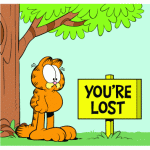Jonna Marika Karvinen
- Faculty of Art and Culture
- Literature, Visual Culture and Film Studies
- ma
- Creativity, Garfield and AI: Using AI to Enhance Our Understanding of Comics
- Tutor(s): Mari Laaniste

Speaking analytically about the medium of comics is like running in the 110 metre hurdles; you may move forward at a great speed but one misstep will bring you down and blow your entire argument wide open – the field of academic comics research, even a few decades in, still feels comparatively new and you cannot always count on the applicability of concepts from other strands of cultural studies to its object of study. Until very recently, comics theory and scholarship largely revolved around the simple question of how to define the term ‘comics’ (Groensteen, 2011, 14). However, with different new theories and recent scholars redefining the field, a short introspective is needed to examine what is required for the advancement of academic discourse on comics.
To outline my reasons for choosing to investigate this particular topic, my interest in comics has been with me since childhood. Like many Finnish children, I learned to read from the weekly Donald Duck magazine and soon expanded my horizons, consuming comics from all around the world by the late teens. I found the wonderful worlds laid out on the pages and screens riveting; a chance to let my eyes explore wild new stories and worlds that someone else had created. Yet their motivations and intentions escaped me; leaving me wondering, as I grew up, about the possible alternative ways of reading comics, and whether it was possible to delineate and explain the formulation of an interesting comic. The stigma of comics being seen as primarily children’s media along with the tacit understanding that adults should have moved on from illustrated books and comics to ‘real’ books as they matured, is still repeated in light discussions about comics as well as mentioned in comics theorist Scott McCloud’s magnum opus Understanding Comics (1993, 140). Comics being part of art and culture discussions is vital and needs more attention. In comics theory-related discussions I took part in, it felt like most of the debate revolved around the definition of the medium; not on the inner workings of actual comics or which analytical tools should be used to study them. In 2013, I first delved into this issue, writing my BA thesis about the possibilities of comics in innovation. Subsequently, I have accumulated suitable background knowledge in the field of comics and, wanting to continue in the same spirit, I can confidently take the vital step towards investigating comics from a scholarly point of view in this MA thesis.
